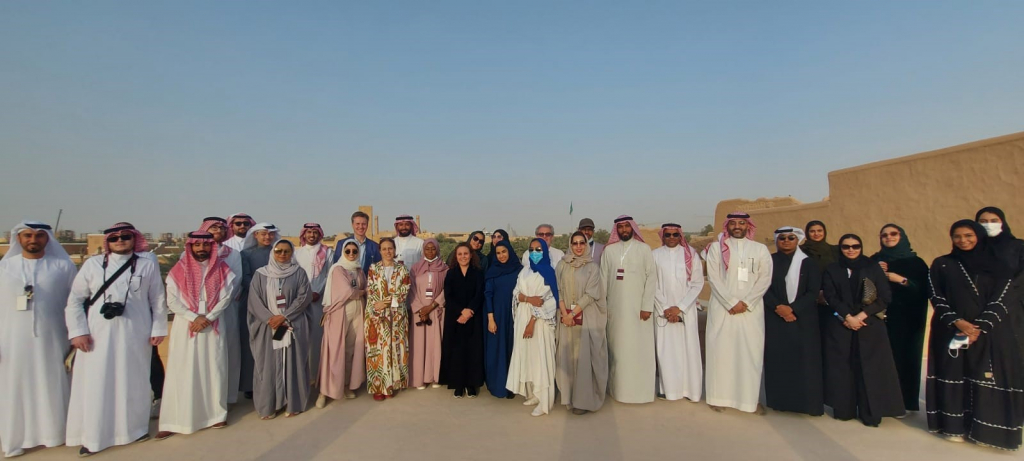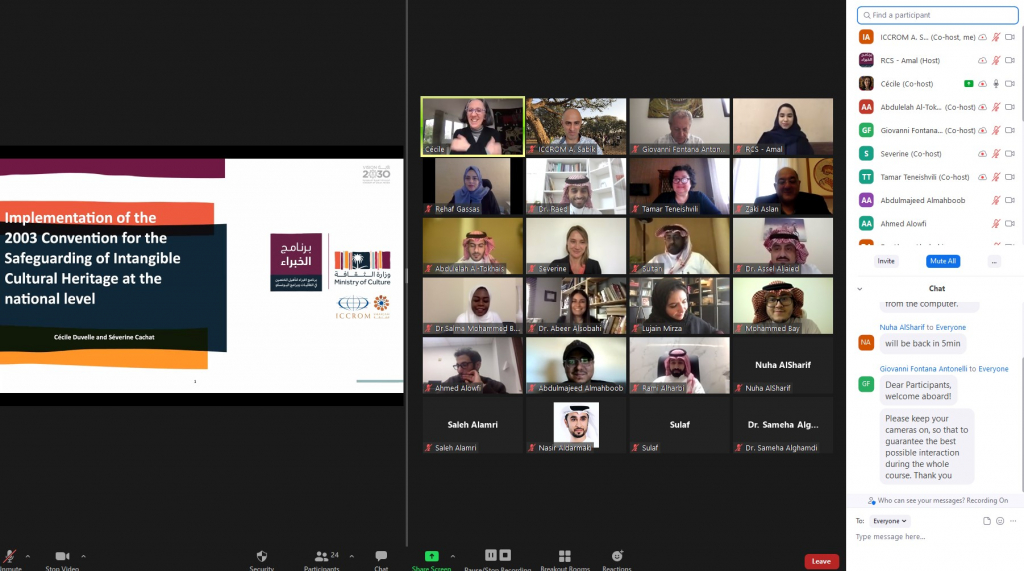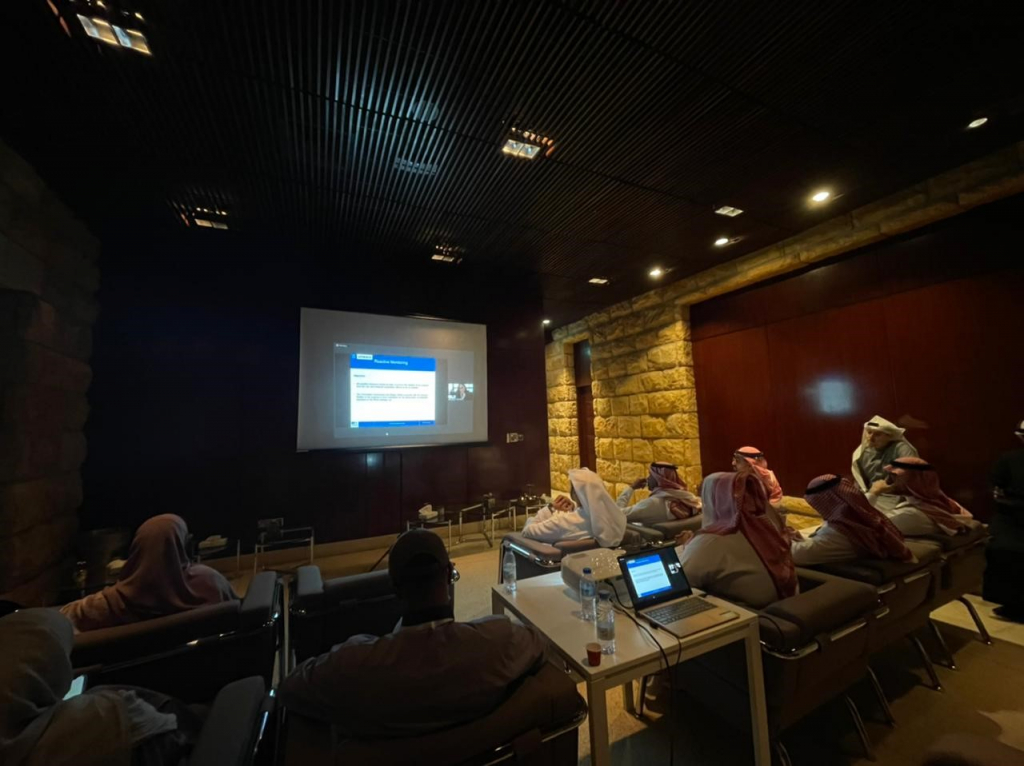Within the framework of the cooperation between the Ministry of Culture of the Kingdom of Saudi Arabia (MOC) and ICCROM, we are conducting a comprehensive training on International Cultural Heritage Conventions and other cultural programmes, called the “Experts Program.”
 Participants and trainers, Site visit to "Diriyah" a World Heritage listed cultural city, KSA.
Participants and trainers, Site visit to "Diriyah" a World Heritage listed cultural city, KSA.The training aims to build a group of experts from Saudi Arabia and neighbouring countries for the implementation of five UNESCO International Cultural Heritage Conventions and two cultural programmes. In particular, the training focuses on: preparing nomination files for international organizations, creating monitoring reports, formulating policies and action plans for management and preservation, and preparing participants to represent their countries at the international level. The Experts Program is divided into two tracks: the 2003 Convention for the Safeguarding of the Intangible Cultural Heritage, and the World Heritage Convention of 1972. The training launched February 2022, with the participation of 39 trainees from Saudi Arabia, the United Arab Emirates (UAE) and Yemen.
The 2003 Convention for the Safeguarding of the Intangible Heritage course
 Online session of 2003 Convention for the Safeguarding of the Intangible Heritage course.
Online session of 2003 Convention for the Safeguarding of the Intangible Heritage course.The 2003 Convention for the Safeguarding of the Intangible Heritage course participants underwent a rich educational experience under the supervision of experienced trainers. This track aimed to provide participants with an understanding of the convention’s basic principles and the main goals and concepts of conservation. It also shed light on international cooperation measures, familiarized participants with the ethics and methods of community-based inventory, and underlined the requirements for implementing conservation plans. It contributed to raising awareness of relevant issues and increasing participants’ ability to apply basic principles of safeguarding intangible cultural heritage – both locally and internationally.
Participants in this track were trained by:
- Cécile Duvelle - Former Head of the Intangible Heritage Department and Secretary of the Convention for the Safeguarding of the Intangible Cultural Heritage at UNESCO; and
- Séverine Cachat - Member of the National Consultative Committee for Intangible Cultural Heritage Policies in France.
Specialized experts who enriched this track included:
- Chiara Bortolotto - Anthropologist of heritage policy and global governance;
- Janet E. Blake - Professor of human rights law;
- Francesca Cominelli - Associate Professor, University of Paris;
- Cholponai U-G - Head of the Project Implementation Unit at the Aigine Center for Convention Research, Kyrgyzstan;
- Diego Rinallo - Associate Professor in Marketing at EM Business School, France; and
- Ahmed Skounti - Anthropologist at the National Institute of Archeology and Heritage Sciences, Morocco.
World Heritage Convention 1972 course
 Participants during a training session
Participants during a training session The second track of the Experts Program was an intensive, hybrid training programme concerning the World Heritage Convention of 1972.The course provided knowledge on the Convention’s philosophy and principles, in addition to discussing the development of the concepts of world and natural heritage in all its forms (including archaeological areas, buildings and historical sites, cultural and natural landscapes, religious and commercial roads, engineering works and biodiversity).
The course included practical workshops and field visits, such as a visit to At-Turaif District in historic Diriyah, which is a World Heritage Site. Such visits contributed to the trainees' application of theoretical concepts to an existing heritage site. The training also helped participants become familiar with the policies of preparing nomination files, monitoring cultural and natural heritage sites, and aspects of heritage site management, protection and preservation.
The programme was presented by:
- Giovanni Fontana Antonelli - Italian architect and planner; and
- Ona Vileikis Tamayo - Architect and researcher at the Institute of Archeology at University College London.
Speakers included:
- Maaike Sanne Goedkoop - Scientific Assistant at the Center for History and Urban Design Theory, Switzerland;
- Cristina Iamandi - Scientific writer and Professor of Conservation of Heritage and World Heritage;
- Jukka Jokilehto – Former Professor and Coordinator of the Architectural and Cultural Preservation Program at ICCROM;
- Simone Ricca - Architect, President of RC Heritage and collaborator with the World Heritage Center UNESCO, among others;
- May Shaer - Chief of Arab States Unit at UNESCO World Heritage Centre;
- Tim Badman - Head of the Heritage, Culture and Youth Team at IUCN;
- Haifa Abdel Halim - Specialist in World Heritage;
- Giovanni Boccardi - Former Chief of the Emergency Preparedness and Response Unit of UNESCO
- Heba Aziz - Director of ARC-WH;
- Rodrigo Sainz Lara - Architect, Chief of the Technical Support Department of Mexico’s World Heritage Office;
- Kai Weise - Architect, Former President of ICOMOS Nepal, Doctoral researcher in the Department of Archaeology, Durham University
- James Reap - Professor and Director of the Historical Conservation Program at the University of Georgia;
- Eugene Jo - Manager of the ICCROM-IUCN World Heritage Leadership Programme;
- Ayşe Ege Yıldırım - Heritage planner with 25 years’ experience;
- Tamar Teneishvili - Archaeologist, former UNESCO Field Offices director in Cambodia, Lebanon, Iraq and Egypt;
- Mounir Bouchenaki - Former Director-General of ICCROM;
- Zaki Aslan - Director of the ICCROM-Sharjah Regional Office; and
- Francesco Bandarin - Former Director of the UNESCO World Heritage Centre, Assistant Director-General of UNESCO for Culture and Special Advisor to ICCROM's Director-General.
